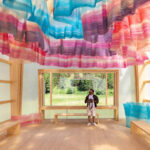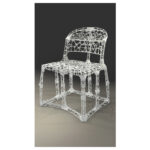The city of Chattanooga in Tennessee has partnered with Branch Technology to develop 3D printed shelters for the homeless. These cube-shaped buildings, located on a vacant lot owned by Olivet Baptist Church, are intended to serve as secure temporary housing for homeless individuals transitioning into more permanent homes.
The city hopes that these shelters will address the lack of emergency and crisis shelter options in the area. Branch Technology took a collaborative approach by involving local service providers and individuals with lived experiences of homelessness in the design process.

Chattanooga has experienced a decline in unsheltered homelessness, but there are still around 600 individuals living on the streets. The 3D printed shelters, equipped with power, fire safety features, and temperature control, offer essential amenities such as a microwave, refrigerator, bed, and storage space. The goal is for residents to stay in these shelters for approximately 90 days, allowing new tenants to rotate in. A case manager will provide daily support to help residents with tasks like paperwork and acquiring necessary documents, facilitating their transition to permanent housing.
The city relies on referrals from the Chattanooga Regional Homeless Coalition to select occupants for the shelters, with a focus on those experiencing chronic homelessness. If the pilot program, funded in part by the city’s innovation fund, proves successful, Chattanooga is open to exploring the expansion of 3D printed shelters in other areas. The city also offers alternative temporary housing options, including a sanctioned homeless camp and a forthcoming low-barrier shelter.
Branch Technology CEO Ryan Lusk envisions more modular and easily adjustable versions of the shelters to accommodate larger numbers of people. The company aims to develop a leasing model to rent out the shelters and promote their reuse. This approach aligns with the goal of placing individuals into more permanent housing while offering temporary solutions. Additionally, the shelters could serve as temporary housing for disaster victims or refugees. Chattanooga hopes for increased involvement from the faith-based community and additional temporary shelters throughout the city.
Come and let us know your thoughts on our Facebook, Twitter, and LinkedIn pages, and don’t forget to sign up for our weekly additive manufacturing newsletter to get all the latest stories delivered right to your inbox.










